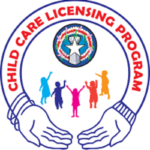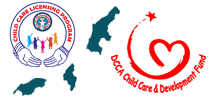CNMI Child Care Licensing Program
The Child Care Licensing Program (“CCLP”) under the Department of Community and Cultural Affairs (“DCCA”) is the responsible Commonwealth agency in licensing child care services in the Commonwealth of the Northern Mariana Islands (“CNMI”) in coordination with other relevant Commonwealth agencies. It regulates and monitors licensed child care facilities throughout the CNMI. Additionally, CCLP performs employment history checks, background information checks, and criminal background checks on all applicants inclusive of the applicants’ staff members.

- Licensing and Monitoring Process
- Read what to expect as your child grows.
- Steps to Finding the Best Child Care for Your Family
- CCLP Standard Operation Procedures (SOP)
- Learn where to get help to pay for what your family needs
- Quality Rating and Improvement System (QRIS)
- Injurines in Child Care Settings (AGGREGATE DATA)
- Child Abuse Cases In Child Care Settings (Aggregate Data On Stubstantiated Cases)
- 3 years of monitoring data relative to serious injuries, deaths, and substantiated child abuse in the child care setting.
- Early Learning and Development Guidelines Ages Birth to Five
- Child Care Standards Rules And Regulations, Subchapter 55-40.1
- Complaint Process
- Background Check Procedures
- Amended Background Check Requirements
- Criminal Background Check Consent Form
- Day Care Centers
- Agency Regulators
- Agency Partners
- Death in the Child Care Settings (AGGREGATE DATA)
- CNMI PDG B-5: Safe, Healthy and Thriving Children
- Inspection Monitoring Checklist
Pursuant to 6 CMC § 5312. Child Abuse: Defined.
(a) A person commits the offense of child abuse if the person:
(1) Willfully and intentionally strikes, beats or by any act or omission inflicts physical pain, injury or mental distress upon a child under the age of 18 who is in the person’s custody or over which the person occupies a position of authority, such pain or injury being clearly beyond the scope of reasonable corporal punishment, with the result that the child’s physical or mental health and well-being are harmed or threatened;
(2) Through willful or negligent act or omission fails to provide a child under the age of 18, who is in the person’s custody or over which the person occupies a position of authority, with adequate supervision, medical care, food, clothing or shelter with the result that the child’s physical or mental health and well-being are harmed or threatened; or
(3) Commits any act that would constitute a criminal offense under 6 CMC §§ 1306-1311 against a child under the age of 18 who is in the person’s custody or over which the person occupies a position of authority.
(b) Child abuse does not include the exercise of reasonable and traditional parental discipline, which may be determined in reference to prevailing community and cultural standards.
(c) A person convicted of child abuse may be punished by imprisonment for not more than five years, a fine of not more than $2,000, or both; however, the court may, upon conviction, order that the person be provided with appropriate counseling to cure, alleviate or prevent psychological problems that are judged to be related to the child abuse incident.
(d) As used in this chapter, “position of authority” means an employer, youth leader, scout leader, coach, teacher, counselor, school administrator, religious leader, doctor, nurse, psychologist, guardian ad litem, babysitter, or substantially similar position, and a police officer or probation officer other than when the officer is exercising custodial control over a minor.
(e) As used in this chapter, “in the person’s custody” means in the custody of the child’s parent (including natural parents, stepparents and adopted parents), legal guardian, foster parent, an employee of a public or private residential home or facility, or any other person over the age of 18 responsible for the child’s welfare in a residential setting.
(f) As used in this chapter, “willful or negligent action or omission” includes both negligent treatment and maltreatment as defined by federal regulation.
(g) As used in this chapter, “mental distress” means an effect on the intellectual or psychological capacity of a child as evidenced by observable and substantial impairment of his ability to function within normal ranges of performance and behavior, with due regard to his culture.
Pursuant to 6 CMC § 5313. Duty to Report Incidents of Child Abuse.
(a) Any health care worker, school teacher or other school official, day care provider, counselor, social worker, peace officer or other law enforcement official who comes into contact in a professional capacity with a child who the person knows or has reasonable cause to suspect is, or will become, a victim of child abuse shall report this knowledge or suspicion directly to the Department of Public Safety.
(1) Any report required under this chapter shall be made to the Department of Public Safety promptly, which in no circumstances shall exceed 24 hours from the time that the person making the report first knew, or had reasonable cause to suspect that the child in question is, or will become, a victim of child abuse.
(2) The report shall contain a statement of the time, date, circumstances and details or information which gave rise to the knowledge or suspicion that the child in question is, or will become, a victim of child abuse.
(3) All reports required under this chapter to be made to the Department of Public Safety may not be disclosed to the public.
(b) The Department of Public Safety shall promptly notify the Office of the Attorney General and the Division of Youth Services of all reports made under this chapter. This notification shall be within 24 hours of receipt of any such report by DPS.
(c) Any person or official required to report cases of known or suspected child abuse may take or cause to be taken photographs of the areas of trauma visible on a child who is the subject of a report and, if medically indicated, cause a radiological examination to be performed on the child. Any photographs or x-ray taken shall be sent to the Department of Public Safety at the time the report is sent or as soon thereafter as possible.
(d) Any person or official required to report cases of known or suspected child abuse who has reasonable cause to suspect that a child died as a result of child abuse or neglect shall report that fact to the medical examiner. The medical examiner shall accept the report for investigation and report its findings to the Department of Public Safety, the Attorney General and the Division of Youth Service and, if the report is made by the hospital, the Director of Public Health and Environmental Services.
(e) Any person not obligated to do so by this chapter, may, at any time, voluntarily report known or suspected instances of child abuse to the Department of Public Safety.
(f) In any instance where a report required under this chapter involved an act or omission of the Department of Public Safety or its personnel or agents, notification of the report may, alternatively, be made to the Office of the Attorney General. Any such report shall comport with the same requirements as set forth above.
(g) For purposes of this section:
(1) “health care worker” includes a person who is, or purports to be, an anesthesiologist, acupuncturist, chiropractor, dentist, health aide, hypnotist, massage therapist, mental health counselor, midwife, nurse, nurse practitioner, osteopath, naturopath, physical therapist, physical therapy assistant, physician, physician’s assistant, psychiatrist, psychologist, psychologist associate, radiologist, religious healing practitioner, surgeon, x-ray technician, or substantially similar position.
(2) “day care provider” includes persons who operate or are employed by day-care centers, nurseries or alternative schools; nannies; au-pair workers; or any other person who is entrusted with the temporary care of a minor child in return for compensation, but does not include babysitters who are themselves minor children.
To report alleged child abuse/neglect that requires immediate attention, call the CNMI Department of Public Safety (DPS). It is advisable to also inform the Division of Youth Services Child Protection Unit (DYS-CPU). Aside from DPS and DYS-CPU, you must also contact the Department of Community and Cultural Affairs Child Care Licensing Program (670-664-2572) and report such incidents to a CCLP Safety Inspector.
Resource:
- Reporting Child Abuse - Neglect
- Licensing and Monitoring Process
- Read what to expect as your child grows.
- Steps to Finding the Best Child Care for Your Family
- CCLP Standard Operation Procedures (SOP)
- Learn where to get help to pay for what your family needs
- Safe, Healthy, and Thriving Children CNMI PDG B-5:
- Child Care Standards Rules And Regulations, Subchapter 55-40.1
- Child Care Standards Rules And Regulations, Subchapter 55-40.1
- Child Care Standards Rules And Regulations, Subchapter 55-40.1
- Early Learning and Development Guidelines Ages Birth to Five
Reports:
- Child Abuse Cases In Child Care Settings (Aggregate Data On Stubstantiated Cases)
- 3 years of monitoring data relative to serious injuries, deaths, and substantiated child abuse in the child care setting.
- Early Learning and Development Guidelines Ages Birth to Five
- Injurines in Child Care Settings (AGGREGATE DATA)
- Death in the Child Care Settings (AGGREGATE DATA)
- 2023 Inspection Report
- 2022 Inspection Report
- 2021 Inspection Report
- 2020 Inspection Report
- 2019 Inspection Report
- 2018 Inspection Report
- 2017 Inspection Report
- 2016 Inspection Report
Partners:
Application:
- Criminal Background Check. Consent and Release Form for Fingerprinting and Comprehensive Background History
- Part 200/400 (Childcare Centers, Before/After School Pro., Group Home, and Infant/Toddler Program) 02.27.24
- Part 300 (Family Child Care Home) application form
- Background Check Procedures
- Amended Background Check Requirements
- Criminal Background Check Consent Form
- Inspection Monitoring Checklist
- Complaint Process
CCLP Forms:
Grant Announcement and Grant Application Cares Funds Part III for License center based programs 03.26.2021
